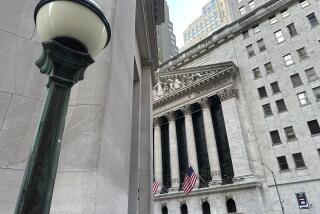CPI Boosts Dow 27; Yields Hit New Low : Market Overview
- Share via
Stocks closed sharply higher Wednesday, bolstered by news that consumer inflation remained at bay in June.
* Yields on long-term Treasury bonds dropped to a fifth consecutive low in response to the inflation news.
* Crude oil futures plunged on news that the United Nations may soon allow Iraq to sell oil.
Stocks
Stocks started strong early, after the Labor Department said the consumer price index was unchanged in June. Treasury prices also rallied on the news, pushing down yields on the long bond to record lows.
The Dow Jones industrial average rose 27.11 points to 3,542.55 on Big Board volume of 297.43 million shares, up from 237.15 million. Advancing issues outnumbered declines by about 11 to 7 on the New York Stock Exchange.
It was the first month without an increase in the price index since March, 1991, and the news was better than the 0.1% rise many economists had expected.
Today’s report on consumer prices, following Tuesday’s news that wholesale prices fell 0.3% last month, squelched any lingering suspicions among economists that inflation was about to accelerate.
It also puts off, at least until late this year, the possibility that the Federal Reserve Board will nudge short-term interest rates higher, analysts said.
Share prices rallied because stock investors like low interest rates, which allow corporations to borrow for less and make stocks more attractive.
Transportation issues soared as oil prices tumbled to their lowest levels since the Persian Gulf War, amid indications that Iraq may add its oil production to an already over-supplied market.
* UAL, parent of United Airlines, jumped 6 3/4 to 133, in part on the lower oil prices, but also on rumors that United pilots were trying to put together a buyout of the company, analysts said.
* The stocks of several large retailers rallied after the CPI news. Sears, Roebuck rose 1 7/8 to 44 3/8 and J.C. Penney jumped 3/4 to 45 1/2.
Still, there were earnings disappointments. Dell Computer forecast a second-quarter loss and topped the NASDAQ most-active list, falling 3 3/8 to 15 7/8.
* Kelley Oil fell 6 3/4 to 15 after a company report said preliminary indications are that its Goldsby No. 2 well won’t produce at rates expected by some analysts. On the Amex, Kelley Oil & Gas fell 3 to 18.
* In NYSE trading, Repsol was the most actively traded issue, rising 1/8 to 24 1/8. The Spanish state trimmed its stake in the oil and gas company to 40.5% from 41.1% in a bond-for-stock swap.
* Federal Express rose 6 1/2 to 53 3/8. The company announced better than expected fourth-quarter earnings.
* Many financial stocks fell as investors took profits on solid second-quarter earnings of several brokerages. Merrill Lynch dropped 2 1/4 to 82 3/8.
Overseas, stocks ended slightly lower in Tokyo, with the 225-share Nikkei index losing 41.31 points to close at 20,139.11. Germany’s 30-share DAX average closed up 4.39 points at 1,811.55. In London, the Financial Times 100-share average finished 4.8 points lower at 2,832.2.
Credit
The strong demand for bonds led to speculation that the Treasury market’s powerful 1993 rally had gained new momentum that could drive yields to even lower levels.
The yield on the benchmark 30-year government bond plunged to 6.56%, its lowest in 16 years. It finished at 6.61% on Tuesday, the lowest level since the Treasury began regularly auctioning 30-year bonds in 1977.
The price of the main bond, which moves in the opposite direction from the yield, jumped 11/16 point, or $6.88 per $1,000 in face value.
As yields threatened to plunge below 6.50%, a widely perceived bottom for their recent downtrend, some market participants began revising their forecasts for how low yields could go. Some predictions now call for yields of 6.25% or lower.
Short-term Treasuries rose between 3/32 point and 1/8 point, and intermediate maturities rose between 3/16 point and 5/16 point, the Telerate Inc. financial information service reported.
The federal funds rate, the interest on overnight loans between banks, was 2.938%, unchanged from Tuesday.
Other Markets
Oil prices were also pushed lower by an American Petroleum Institute inventory report, released late Tuesday, that showed an unexpected rise in crude oil, gasoline and distillate stocks.
An agreement between Iraq and the United Nations on oil sales would allow Iraq to sell $1.6 billion worth of crude oil over six months.
Iraq has been barred from selling oil since it invaded Kuwait in 1990, leading to the Gulf War the following year. It is seeking permission to resume sales in order to buy food and medicine.
The petroleum institute figures show that for the week ending July 9, crude stocks rose 4.1 million barrels. Gasoline stocks rose 1.7 million barrels and distillate stocks--heating oil and diesel fuel--rose 4.71 million barrels.
Light, sweet crude oil for August delivery settled 68 cents lower at $17.45 a barrel.
Gold for current delivery settled at $390.90 an ounce, down $3.10 from Tuesday. Silver settled at $4.936 an ounce, down from $5.040 on Tuesday.
Meanwhile, in currency trading, the dollar ended lower against most major currencies in light, uneventful trading.
In New York, the dollar closed at 107.10 Japanese yen, down from 108.13 yen Tuesday. The greenback also fell against the German mark, closing at 1.715 marks, down from Tuesday’s 1.719.
Market Roundup, D6
More to Read
Inside the business of entertainment
The Wide Shot brings you news, analysis and insights on everything from streaming wars to production — and what it all means for the future.
You may occasionally receive promotional content from the Los Angeles Times.










